Boyle J.A. The Cambridge History of Iran, Volume 5: The Saljuq and Mongol Periods
Подождите немного. Документ загружается.

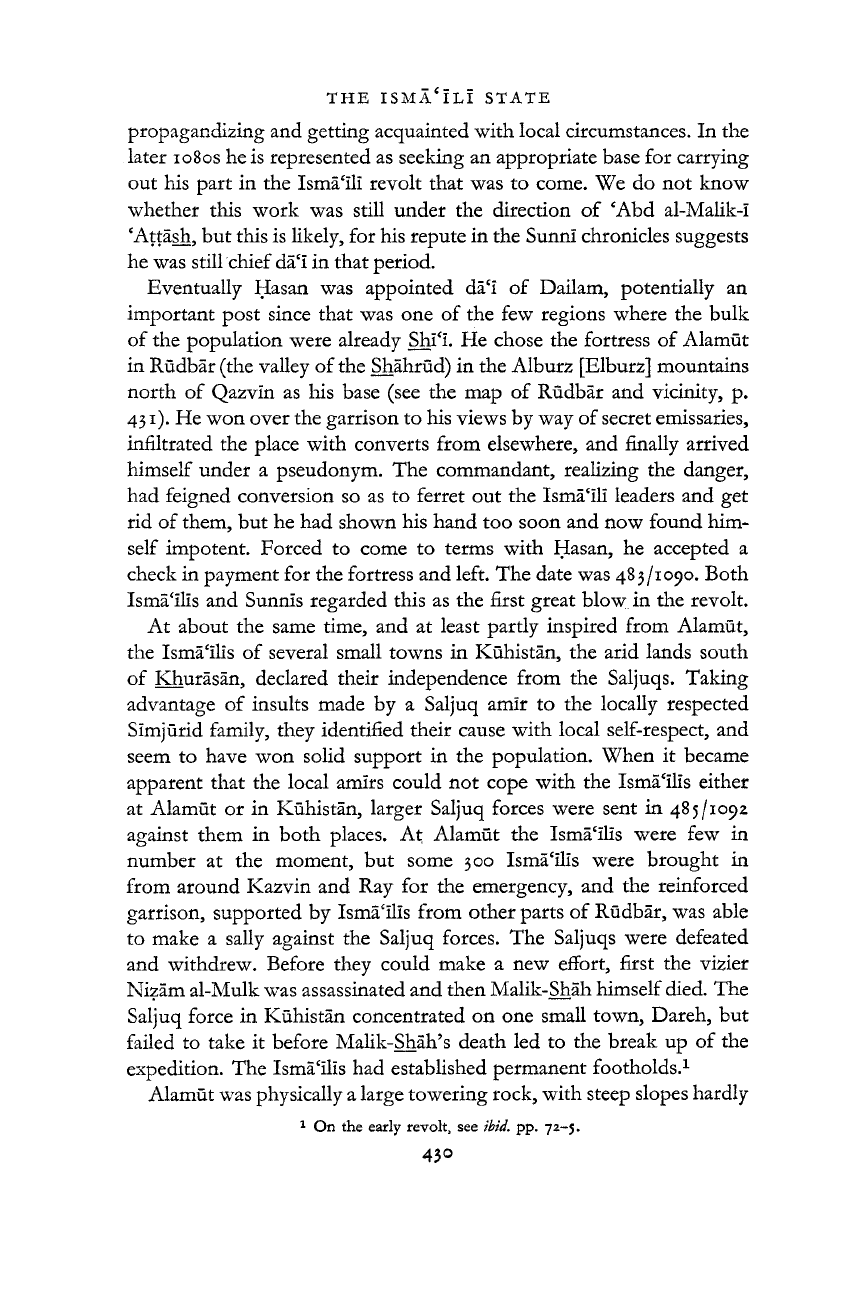
THE
ISMA'ILI
STATE
propagandizing and getting acquainted with local circumstances. In the
later 1080s he is represented as seeking an appropriate base for carrying
out his
part
in the Isma'Ili revolt
that
was to come. We do not know
whether this work was still under the direction of 'Abd al-Malik-i
'Attash,
but this is
likely,
for his repute in the Sunni chronicles suggests
he was still
chief
da'I in
that
period.
Eventually
Hasan was appointed da'I of Dailam, potentially an
important post since
that
was one of the few regions where the bulk
of
the population were already Shi'i. He chose the fortress of Alamut
in Rudbar (the valley of the Shahrud) in the Alburz [Elburz] mountains
north
of Qazvin as his base (see the map of Rudbar and vicinity, p.
431).
He won over the garrison to his
views
by way of secret emissaries,
infiltrated the place with converts from elsewhere, and finally arrived
himself
under a pseudonym. The commandant, realizing the danger,
had feigned conversion so as to ferret out the Isma'Ili leaders and get
rid of them, but he had shown his hand too soon and now found him-
self
impotent. Forced to come to terms with Hasan, he accepted a
check
in payment for the fortress and left. The date was 483/1090. Both
Isma'Ilis and Sunnls regarded this as the first great blow in the revolt.
At
about the same time, and at least partly inspired from Alamut,
the Isma'Ilis of several small towns in Kuhistan, the arid lands south
of
Khurasan, declared their independence from the Saljuqs. Taking
advantage of insults made by a Saljuq amir to the locally respected
Simjurid
family, they identified their cause with local self-respect, and
seem
to have won solid support in the population. When it became
apparent
that
the local amirs could not cope with the Isma'Ilis either
at Alamut or in Kuhistan, larger Saljuq forces were sent in 485/1092
against them in both places. At Alamut the Isma'Ilis were few in
number at the moment, but some 300 Isma'Ilis were brought in
from
around
Kazvin
and Ray for the emergency, and the reinforced
garrison, supported by Isma'Ilis from other
parts
of Rudbar, was able
to make a sally against the Saljuq forces. The Saljuqs were defeated
and withdrew. Before they could make a new effort, first the vizier
Nizam
al-Mulk was assassinated and then Malik-Shah himself died. The
Saljuq
force in Kuhistan concentrated on one small town, Dareh, but
failed
to take it before Malik-Shah's death led to the break up of the
expedition.
The Isma'Ilis had established permanent footholds.
1
Alamut
was
physically
a large towering rock, with steep slopes hardly
1
On the early revolt, see
ibid.
pp. 72-5.
430
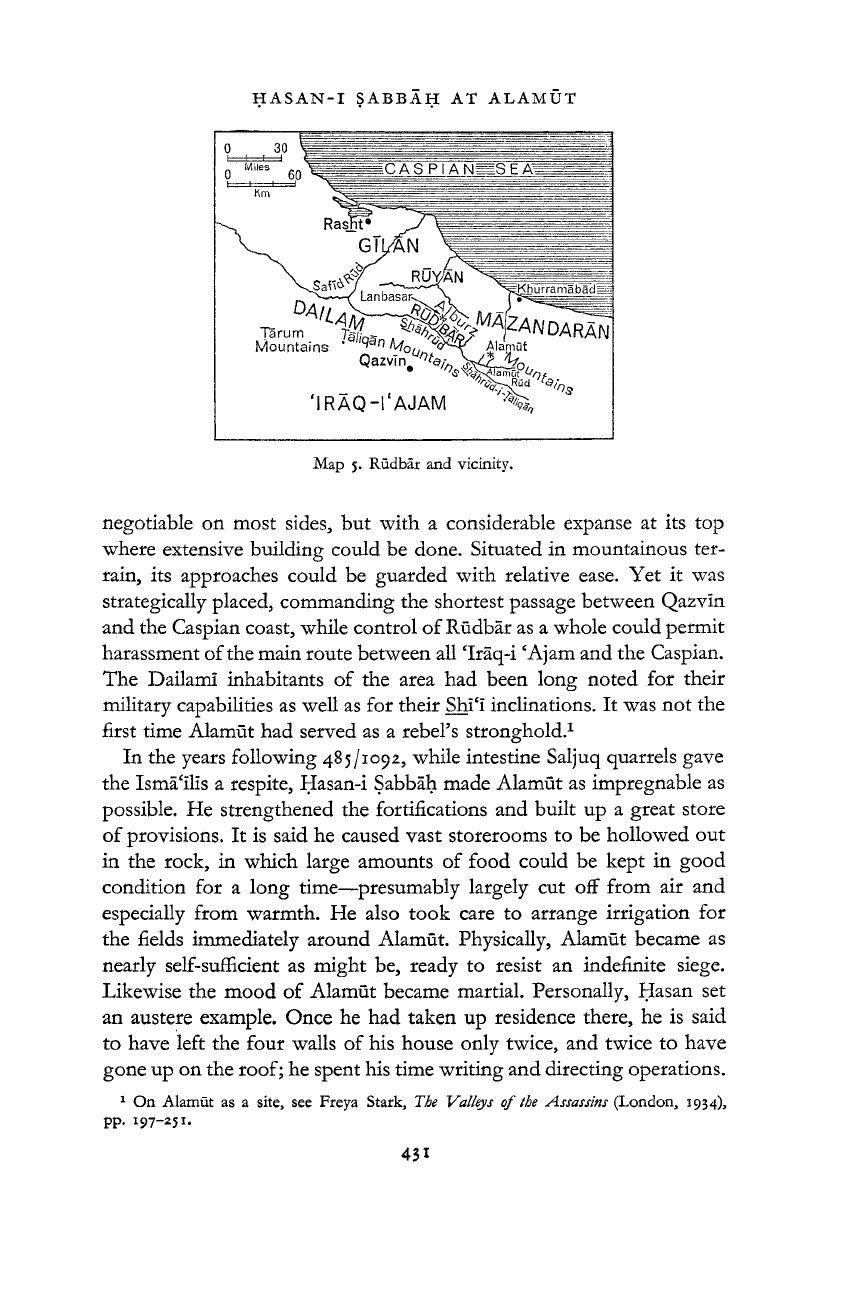
HASAN-I
SABBAH
AT
ALAMUT
Map
5. Rudbar and vicinity.
negotiable on most sides, but with a considerable expanse at its top
where extensive building could be done. Situated in mountainous
ter-
rain, its approaches could be guarded with relative ease. Yet it was
strategically placed, commanding the shortest passage between Qazvin
and the Caspian coast, while control of Rudbar as a whole could permit
harassment
of
the main
route
between all 'Iraq-i
c
Ajam
and the Caspian.
The
Dailami
inhabitants
of the area had been long noted for their
military capabilities as
well
as for their Shi'i inclinations. It was not the
first time Alamut had served as a rebel's stronghold.
1
In the years following 485/1092, while intestine Saljuq quarrels gave
the Isma'Ilis a respite, Hasan-i Sabbah made Alamut as impregnable as
possible.
He strengthened the fortifications and built up a great store
of
provisions. It is said he caused vast storerooms to be hollowed out
in the rock, in which large amounts of food could be kept in good
condition for a long time—presumably largely cut off from air and
especially
from warmth. He also took care to arrange irrigation for
the fields immediately around Alamut. Physically, Alamut became as
nearly self-sufficient as might be, ready to resist an indefinite siege.
Likewise
the mood of Alamut became martial. Personally, Hasan set
an austere example. Once he had taken up residence there, he is said
to have left the four walls of his house only twice, and twice to have
gone up on the roof; he spent his time writing and directing operations.
1
On Alamut as a site, see Freya Stark, The Valleys of
the
Assassins (London,
1934),
pp. 197-251.
43*
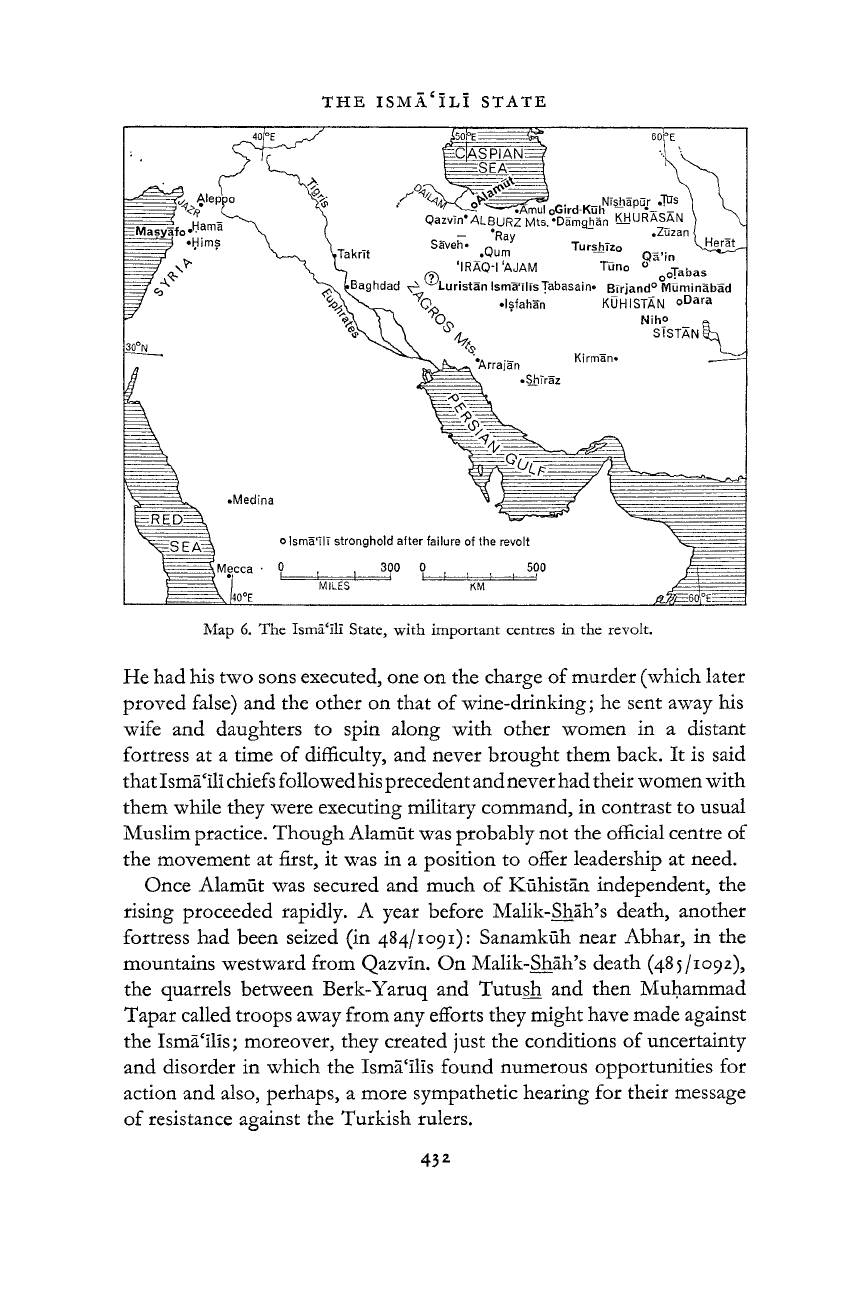
THE
ISMA'ÌLÌ
STATE
Map
6. The Isma'ili State, with important centres in the revolt.
He had his two sons executed, one on the charge of murder (which later
proved false) and the other on
that
of wine-drinking; he sent away his
wife
and daughters to spin along with other women in a distant
fortress at a time of difficulty, and never brought them back. It is said
that
Isma'ili
chiefs
followed
his precedent and never had their women with
them while they were executing military command, in contrast to usual
Muslim
practice. Though Alamut was probably not the
official
centre of
the movement at first, it was in a position to offer leadership at need.
Once
Alamut was secured and much of Kuhistan independent, the
rising proceeded rapidly. A year before Malik-Shah's death, another
fortress had been seized (in 484/1091): Sanamkuh near Abhar, in the
mountains westward from Qazvin. On Malik-Shah's death (485/1092),
the quarrels between Berk-Yaruq and Tutush and then Muhammad
Tapar called troops away from any efforts they might have made against
the Isma'ilis; moreover, they created just the conditions of uncertainty
and disorder in which the Isma'ills found numerous opportunities for
action and also, perhaps, a more sympathetic hearing for their message
of
resistance against the Turkish rulers.
432
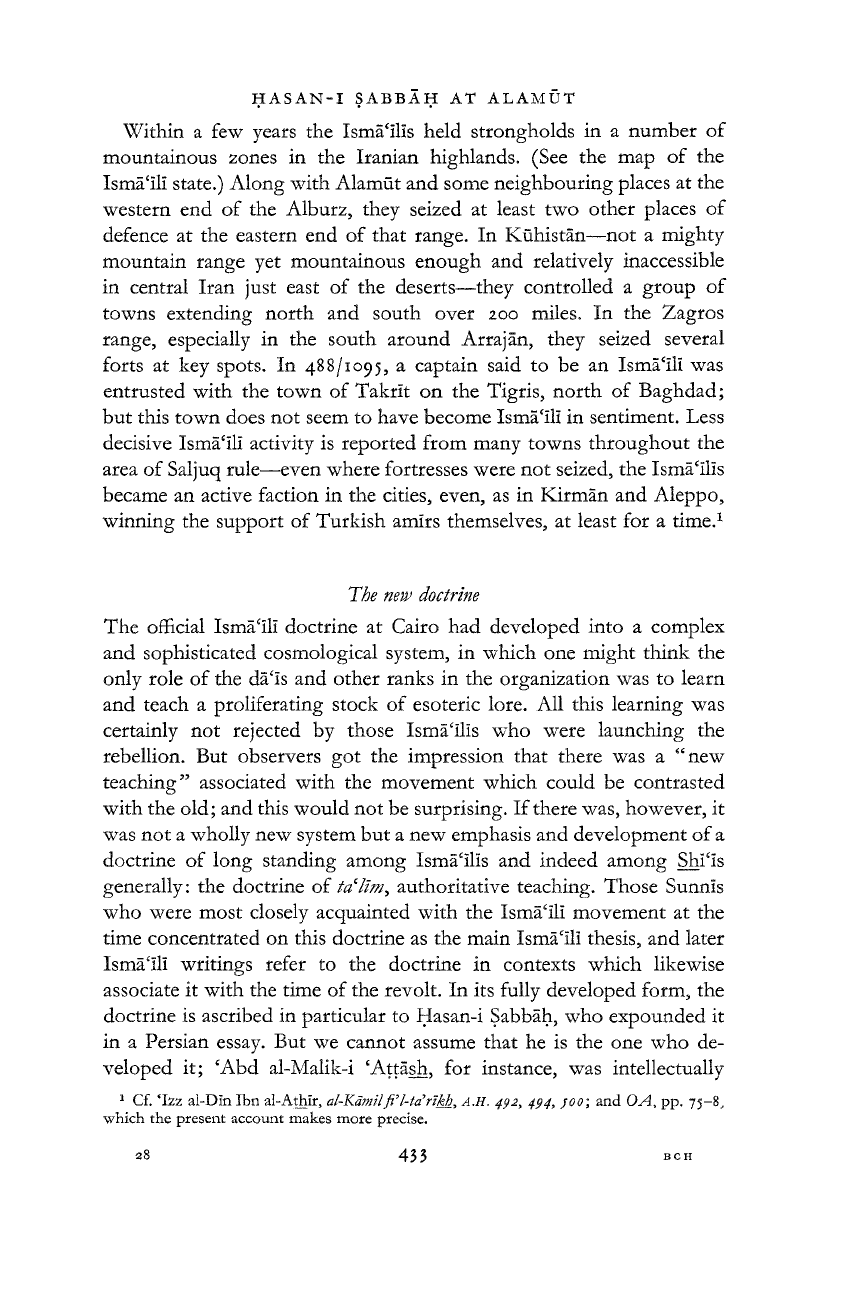
HASAN-I
SABBAH
AT
ALAMUT
28
433
BCH
Within
a few
years
the
Isma'Ilis held strongholds
in a
number
of
mountainous zones
in the
Iranian
highlands.
(See the map of the
Isma'ili state.)
Along
with Alamut and some neighbouring places
at
the
western
end of the
Alburz, they seized
at
least
two
other places
of
defence
at the
eastern
end of
that
range.
In
Kuhistan—not
a
mighty
mountain range
yet
mountainous enough
and
relatively inaccessible
in central
Iran
just east
of the
deserts—they controlled
a
group
of
towns extending
north
and
south over
200
miles.
In the
Zagros
range, especially
in the
south around Arrajan, they seized several
forts
at
key spots.
In
488/1095,
a
captain said
to be an
Isma'ili was
entrusted
with
the
town
of
Takrit
on the
Tigris,
north
of
Baghdad;
but this town does
not
seem
to
have become Isma'ili
in
sentiment. Less
decisive
Isma'ili activity
is
reported from many towns throughout
the
area
of
Saljuq rule—even where fortresses were
not
seized,
the
Isma'Ilis
became
an
active faction
in the
cities, even,
as in
Kirman
and
Aleppo,
winning
the
support
of
Turkish amirs themselves,
at
least
for a
time.
1
The
new
doctrine
The
official
Isma'ili doctrine
at
Cairo
had
developed into
a
complex
and sophisticated cosmological system,
in
which
one
might think
the
only
role
of
the da'Is
and
other ranks
in the
organization was
to
learn
and teach
a
proliferating stock
of
esoteric lore. All this learning
was
certainly
not
rejected
by
those Isma'Ilis
who
were launching
the
rebellion.
But
observers
got the
impression
that
there
was a "new
teaching" associated with
the
movement which could
be
contrasted
with
the old; and this would not be surprising. If
there
was, however,
it
was
not
a
wholly new system but
a
new emphasis and development of a
doctrine
of
long standing among Isma'Ilis
and
indeed among Shi'is
generally:
the
doctrine
of
/#'//>//, authoritative teaching. Those Sunnis
who
were most closely acquainted with
the
Isma'ili movement
at the
time concentrated
on
this doctrine
as the
main Isma'ili thesis,
and
later
Isma'ili writings refer
to the
doctrine
in
contexts which likewise
associate
it
with
the
time of the revolt.
In
its
fully developed form,
the
doctrine
is
ascribed
in
particular
to
Hasan-i Sabbah, who expounded
it
in
a
Persian essay.
But
we
cannot assume
that
he is the one
who
de-
veloped
it;
'Abd
al-Malik-i 'Attash,
for
instance,
was
intellectually
1
Cf.
'Izz al-Din
Ibn
al-Athir,
al-Kdmil
ffl-tcfrikh*
AM. 492, 494, joo; and OA, pp.
75-8,
which
the
present account makes more precise.
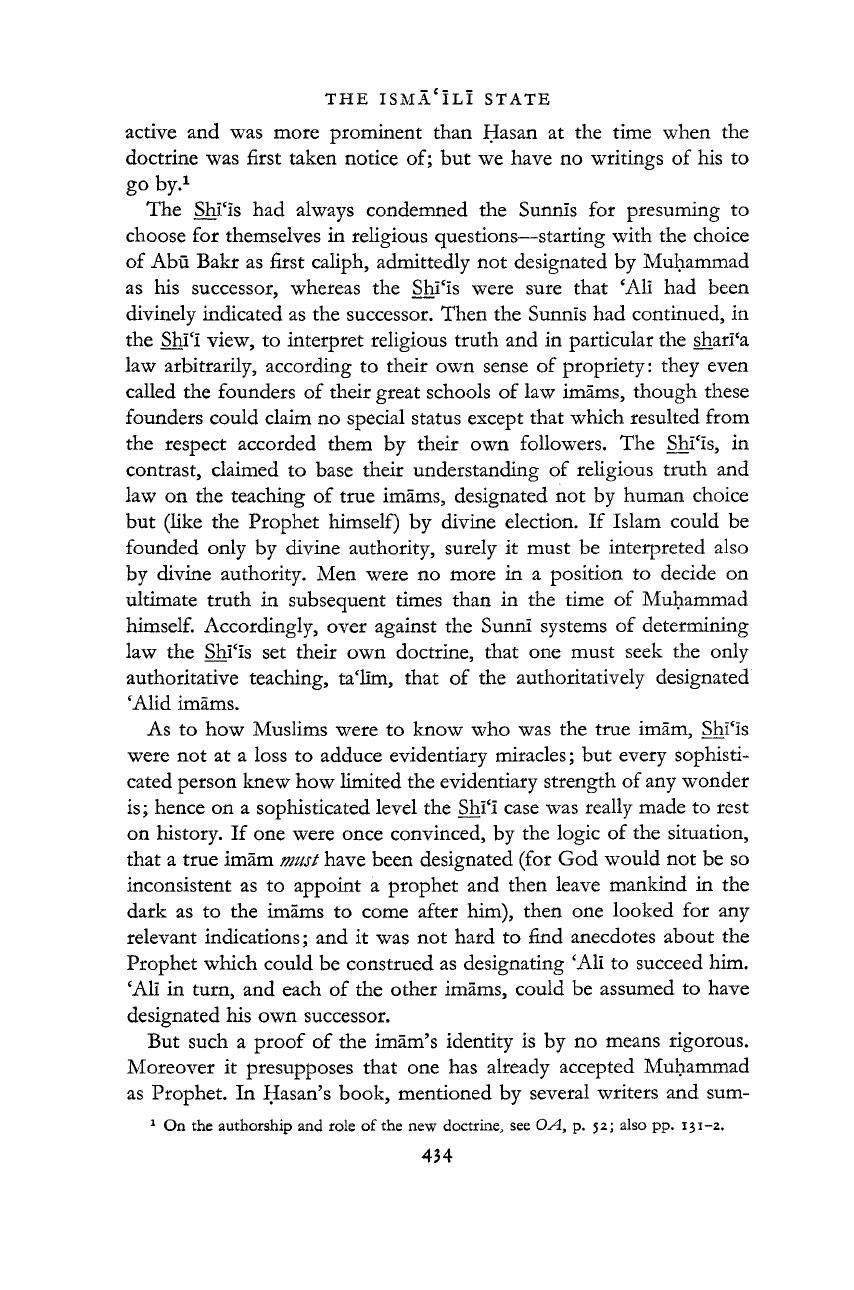
THE
ISMA'ILI
STATE
434
active
and was more prominent
than
Hasan at the time when the
doctrine was first taken notice of; but we have no writings of his to
go
by.
1
The
Shi'is had always condemned the Sunnis for presuming to
choose
for themselves in religious questions—starting with the choice
of
Abu Bakr as first caliph, admittedly not designated by Muhammad
as his successor, whereas the Shi'is were sure
that
'All had been
divinely
indicated as the successor. Then the Sunnis had continued, in
the Shi'i
view,
to interpret religious
truth
and in particular the shari'a
law
arbitrarily, according to their own sense of propriety: they even
called
the founders of their great schools of law imams, though these
founders could claim no special status except
that
which resulted from
the respect accorded them by their own followers. The Shi'is, in
contrast, claimed to base their understanding of religious
truth
and
law
on the teaching of
true
imams, designated not by human choice
but (like the Prophet himself) by divine election. If Islam could be
founded only by divine authority, surely it must be interpreted also
by
divine authority. Men were no more in a position to decide on
ultimate
truth
in subsequent times
than
in the time of Muhammad
himself. Accordingly, over against the Sunni systems of determining
law
the Shi'is set their own doctrine,
that
one must seek the only
authoritative teaching, ta'lim,
that
of the authoritatively designated
'Alid
imams.
As
to how Muslims were to know who was the
true
imam, Shi'is
were
not at a loss to adduce evidentiary miracles; but every sophisti-
cated person knew how limited the evidentiary strength of any wonder
is;
hence on a sophisticated
level
the Shi'i case was really made to rest
on history. If one were once convinced, by the logic of the situation,
that
a
true
imam
must
have been designated (for God would not be so
inconsistent as to appoint a prophet and then leave mankind in the
dark as to the imams to come after him), then one looked for any
relevant indications; and it was not hard to find anecdotes about the
Prophet which could be construed as designating 'All to succeed him.
'AH
in
turn,
and each of the other imams, could be assumed to have
designated his own successor.
But
such a proof of the imam's identity is by no means rigorous.
Moreover
it presupposes
that
one has already accepted Muhammad
as Prophet. In Hasan's book, mentioned by several writers and sum-
1
On the
authorship
and role of the new doctrine, see OA, p. 52; also pp. 131-2.
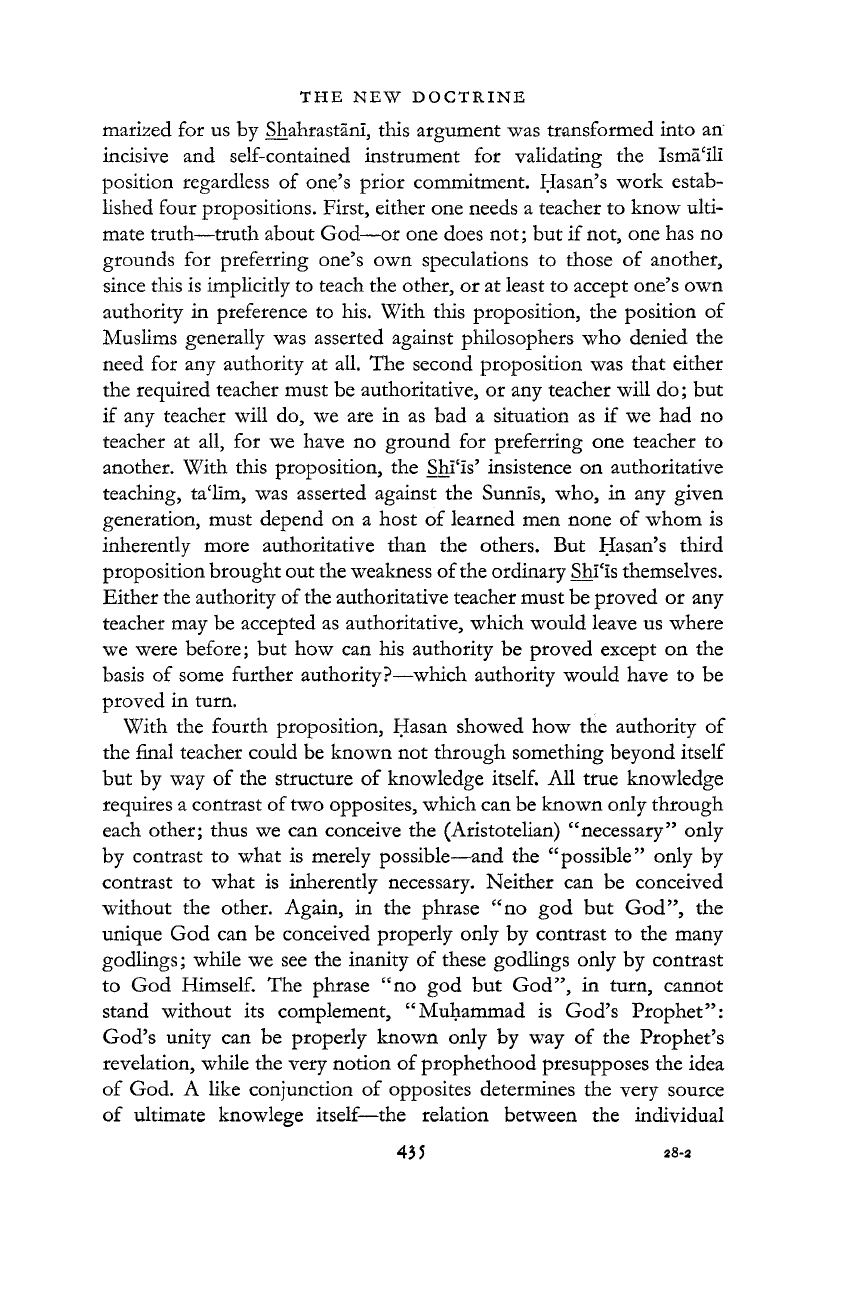
THE
NEW
DOCTRINE
marked for us by Shahrastani, this argument was transformed into an
incisive
and self-contained instrument for validating the Isma'IlI
position regardless of one's prior commitment. Hasan's work estab-
lished
four propositions. First, either one needs a teacher to know ulti-
mate
truth—truth
about God—or one does not; but if not, one has no
grounds for preferring one's own speculations to those of another,
since
this is implicitly to teach the other, or at least to accept one's own
authority in preference to his. With this proposition, the position of
Muslims
generally was asserted against philosophers who denied the
need for any authority at all. The second proposition was
that
either
the required teacher must be authoritative, or any teacher
will
do; but
if
any teacher
will
do, we are in as bad a situation as if we had no
teacher at all, for we have no ground for preferring one teacher to
another. With this proposition, the Ships' insistence on authoritative
teaching, ta'lim, was asserted against the Sunnis, who, in any
given
generation, must depend on a host of learned men none of whom is
inherently more authoritative
than
the others. But Hasan's
third
proposition brought out the weakness
of
the ordinary Shi'Is themselves.
Either the authority of the authoritative teacher must be proved or any
teacher may be accepted as authoritative, which would leave us where
we
were before; but how can his authority be proved except on the
basis of some further authority?—which authority would have to be
proved
in
turn.
With
the fourth proposition, Hasan showed how the authority of
the final teacher could be known not through something beyond itself
but by way of the structure of knowledge itself. All
true
knowledge
requires a contrast of two opposites, which can be known only through
each
other;
thus
we can conceive the (Aristotelian) "necessary" only
by
contrast to what is merely possible—and the "possible" only by
contrast to what is inherently necessary. Neither can be conceived
without the other.
Again,
in the phrase "no god but God", the
unique God can be conceived properly only by contrast to the many
godlings;
while we see the inanity of these godlings only by contrast
to God Himself. The phrase "no god but God", in
turn,
cannot
stand without its complement, "Muhammad is God's Prophet":
God's
unity can be properly known only by way of the Prophet's
revelation,
while the very notion of prophethood presupposes the idea
of
God. A like conjunction of opposites determines the very source
of
ultimate knowlege itself—the relation between the individual
435
28-2
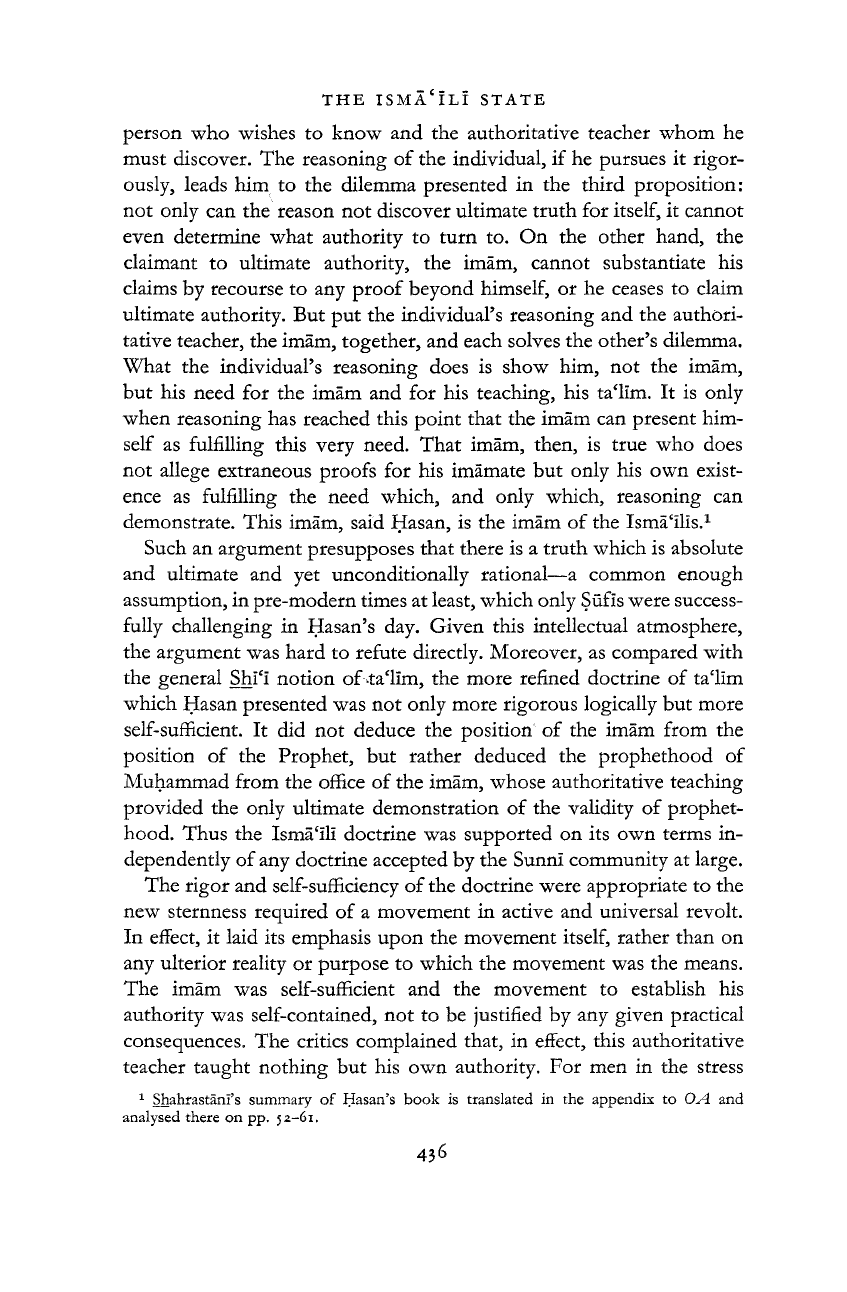
THE
ISMA
c
ILi
STATE
436
person who wishes to know and the authoritative teacher whom he
must discover. The reasoning of the individual, if he pursues it rigor-
ously,
leads him to the dilemma presented in the
third
proposition:
not only can the reason not discover ultimate
truth
for itself, it cannot
even
determine what authority to
turn
to. On the other hand, the
claimant to ultimate authority, the imam, cannot substantiate his
claims
by recourse to any proof beyond himself, or he ceases to claim
ultimate authority. But put the individual's reasoning and the authori-
tative teacher, the imam, together, and each solves the other's dilemma.
What the individual's reasoning does is show him, not the imam,
but his need for the imam and for his teaching, his ta'llm. It is only
when
reasoning has reached this point
that
the imam can present him-
self
as
fulfilling
this very need. That imam, then, is
true
who does
not allege extraneous proofs for his imamate but only his own exist-
ence as
fulfilling
the need which, and only which, reasoning can
demonstrate. This imam, said Hasan, is the imam of the Isma'llls.
1
Such
an argument presupposes
that
there
is a
truth
which is absolute
and ultimate and yet unconditionally rational—a common enough
assumption, in pre-modern times at least, which only Sufis were success-
fully
challenging in Hasan's day.
Given
this intellectual atmosphere,
the argument was hard to refute directly. Moreover, as compared with
the general
Shf
I
notion of .ta'lim, the more refined doctrine of ta'llm
which
Hasan presented was not only more rigorous
logically
but more
self-sufficient.
It did not deduce the position of the imam from the
position of the Prophet, but
rather
deduced the prophethood of
Muhammad from the
office
of the imam, whose authoritative teaching
provided the only ultimate demonstration of the validity of prophet-
hood. Thus the Isma'lli doctrine was supported on its own terms in-
dependently of any doctrine accepted by the Sunni community at large.
The
rigor and self-sufficiency of the doctrine were appropriate to the
new
sternness required of a movement in active and universal revolt.
In
effect,
it laid its emphasis upon the movement itself,
rather
than
on
any ulterior reality or purpose to which the movement was the means.
The
imam was self-sufficient and the movement to establish his
authority was self-contained, not to be justified by any
given
practical
consequences.
The critics complained
that,
in
effect,
this authoritative
teacher taught nothing but his own authority. For men in the stress
1
Shahrastani's summary of Hasan's book is translated in the appendix to OA and
analysed
there
on pp.
52-61.
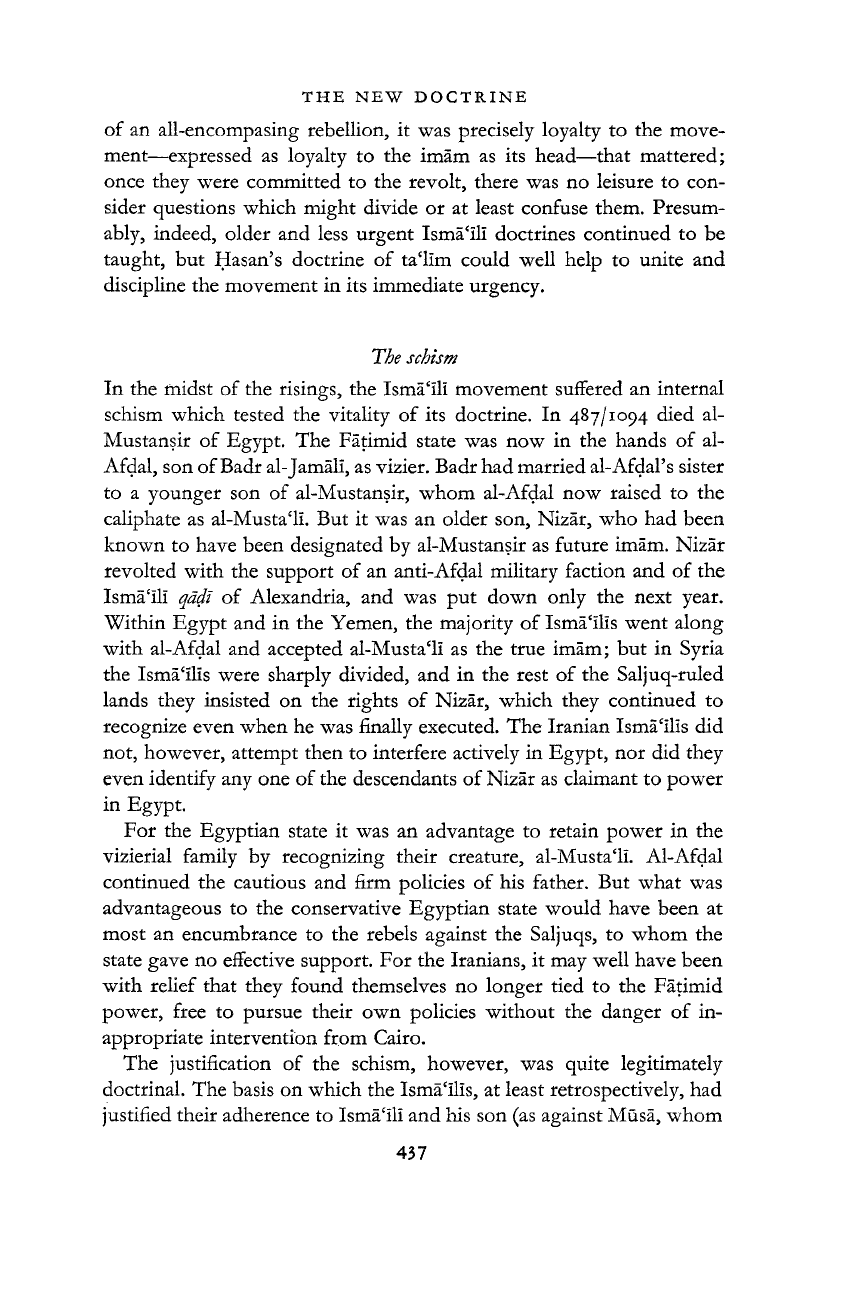
THE NEW DOCTRINE
of
an all-encompasing rebellion, it was precisely loyalty to the move-
ment—expressed as loyalty to the imam as its
head—that
mattered;
once they were committed to the revolt,
there
was no leisure to con-
sider questions which might divide or at least confuse them. Presum-
ably,
indeed, older and less urgent Isma'Ili doctrines continued to be
taught, but Hasan's doctrine of ta'llm could
well
help to
unite
and
discipline the movement in its immediate urgency.
The schism
In the midst of the risings, the Isma'Ili movement suffered an internal
schism which tested the vitality of its doctrine. In 487/1094 died al-
Mustansir of Egypt. The Fatimid
state
was now in the
hands
of al-
Afdal,
son
of
Badr al-Jamali, as vizier. Badr had married al-Afdal's sister
to a younger son of al-Mustansir, whom
al-Afdal
now raised to the
caliphate as al-Musta
c
li. But it was an older son, Nizar, who had been
known to have been designated by al-Mustansir as future imam. Nizar
revolted with the support of an anti-Afdal military faction and of the
Isma'IlI qddi of Alexandria, and was put down only the next year.
Within Egypt and in the
Yemen,
the majority of Isma'llls went along
with
al-Afdal
and accepted al-Musta'H as the
true
imam; but in Syria
the Isma'llls were sharply divided, and in the rest of the Saljuq-ruled
lands they insisted on the rights of Nizar, which they continued to
recognize even when he was finally executed. The
Iranian
Isma'Uis did
not, however,
attempt
then
to interfere actively in Egypt, nor did they
even
identify any one of the descendants of Nizar as claimant to power
in Egypt.
For the Egyptian
state
it was an advantage to retain power in the
vizierial
family by recognizing their creature, al-Musta
c
H.
Al-Afdal
continued the cautious and firm policies of his father. But what was
advantageous to the conservative Egyptian
state
would have been at
most an encumbrance to the rebels against the Saljuqs, to whom the
state
gave no effective support. For the Iranians, it may
well
have been
with relief
that
they found themselves no longer tied to the Fatimid
power, free to pursue their own policies without the danger of in-
appropriate intervention from Cairo.
The justification of the schism, however, was quite legitimately
doctrinal. The basis on which the Isma'llls, at least retrospectively, had
justified their adherence to Isma'ill and his son (as against Musa, whom
437
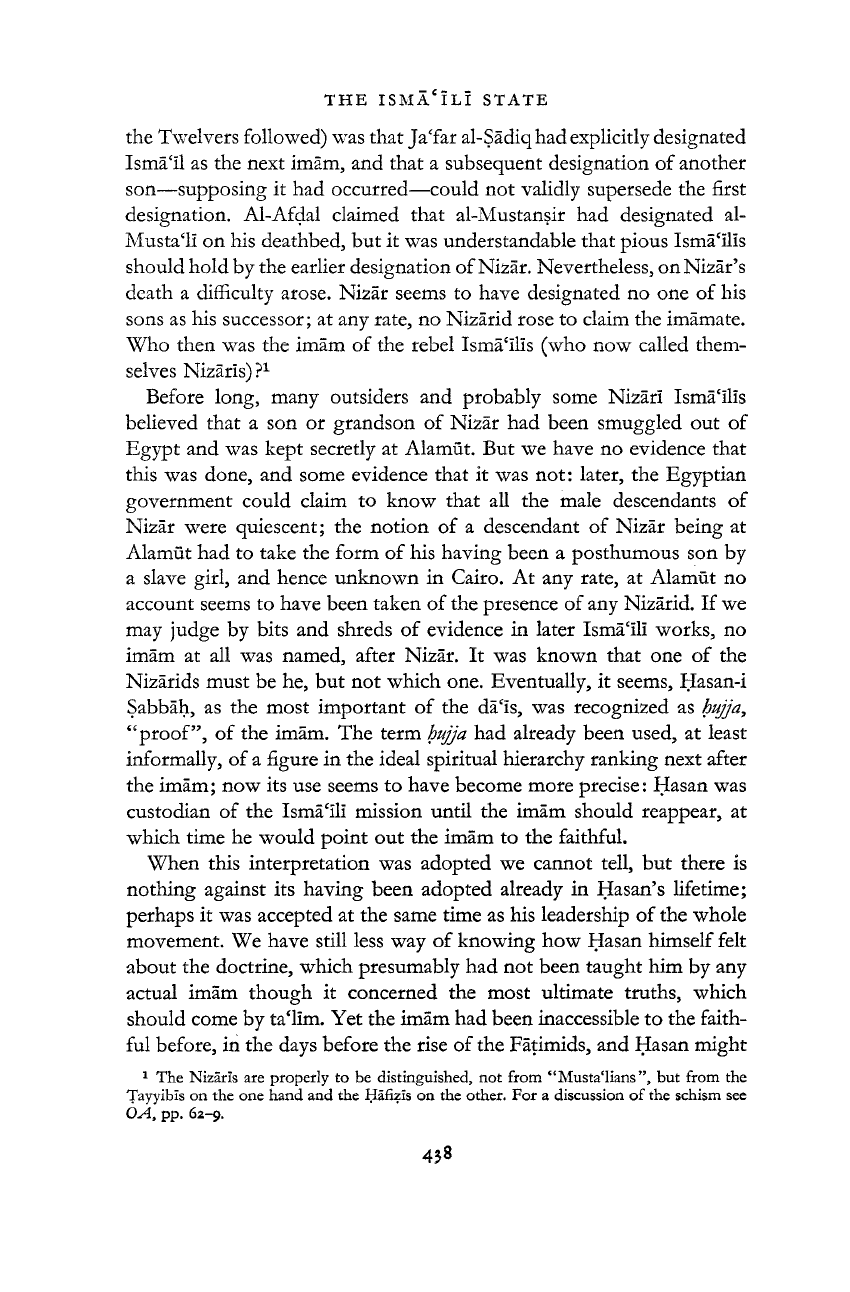
THE ISMÀ'ÌLÌ
STATE
the Twelvers followed) was
that
Ja'far
al-Sadiqhad
explicitly
designated
Isma'il as the next imam, and
that
a subsequent designation of another
son—supposing it had occurred—could not validly supersede the first
designation.
Al-Afdal
claimed
that
al-Mustansir had designated al-
Musta'li on his deathbed, but it was understandable
that
pious Isma'ilis
should hold by the earlier designation
of
Nizar.
Nevertheless, onNizar's
death a difficulty arose. Nizar seems to have designated no one of his
sons as his successor; at any
rate,
no Nizarid rose to claim the imamate.
Who
then
was the imam of the rebel Isma'ilis (who now called them-
selves
Nizaris)?
1
Before
long, many outsiders and probably some Nizari Isma'ilis
believed
that
a son or grandson of Nizar had been smuggled out of
Egypt
and was kept secretly at Alamut. But we have no evidence
that
this was done, and some evidence
that
it was not: later, the Egyptian
government could claim to know
that
all the male descendants of
Nizar
were quiescent; the notion of a descendant of Nizar being at
Alamut
had to take the form of his having been a posthumous son by
a slave girl, and hence unknown in Cairo. At any
rate,
at Alamut no
account seems to have been taken of the presence of any Nizarid. If we
may judge by bits and shreds of evidence in later Isma'ili works, no
imam at all was named, after Nizar. It was known
that
one of the
Nizarids must be he, but not which one. Eventually, it seems, Hasan-i
Sabbah, as the most important of the da'Is, was recognized as hujja,
"proof", of the imam. The term hujja had already been used, at least
informally, of a figure in the ideal spiritual hierarchy ranking next after
the imam; now its use seems to have become more precise: Hasan was
custodian of the Isma'ili mission until the imam should reappear, at
which
time he would point out the imam to the faithful.
When this interpretation was adopted we cannot tell, but
there
is
nothing against its having been adopted already in Hasan's lifetime;
perhaps it was accepted at the same time as his leadership of the whole
movement. We have still less way of knowing how Hasan himself felt
about the doctrine, which presumably had not been taught him by any
actual imam though it concerned the most ultimate
truths,
which
should come by ta'llm. Yet the imam had been inaccessible to the faith-
ful
before, in the days before the rise of the Fatimids, and Hasan might
1
The Nizaris are properly to be distinguished, not from "Musta'lians", but from the
Tayyibis
on the one
hand
and the Hafizls on the
other.
For a discussion of the schism see
OA,
pp. 62-9.
458
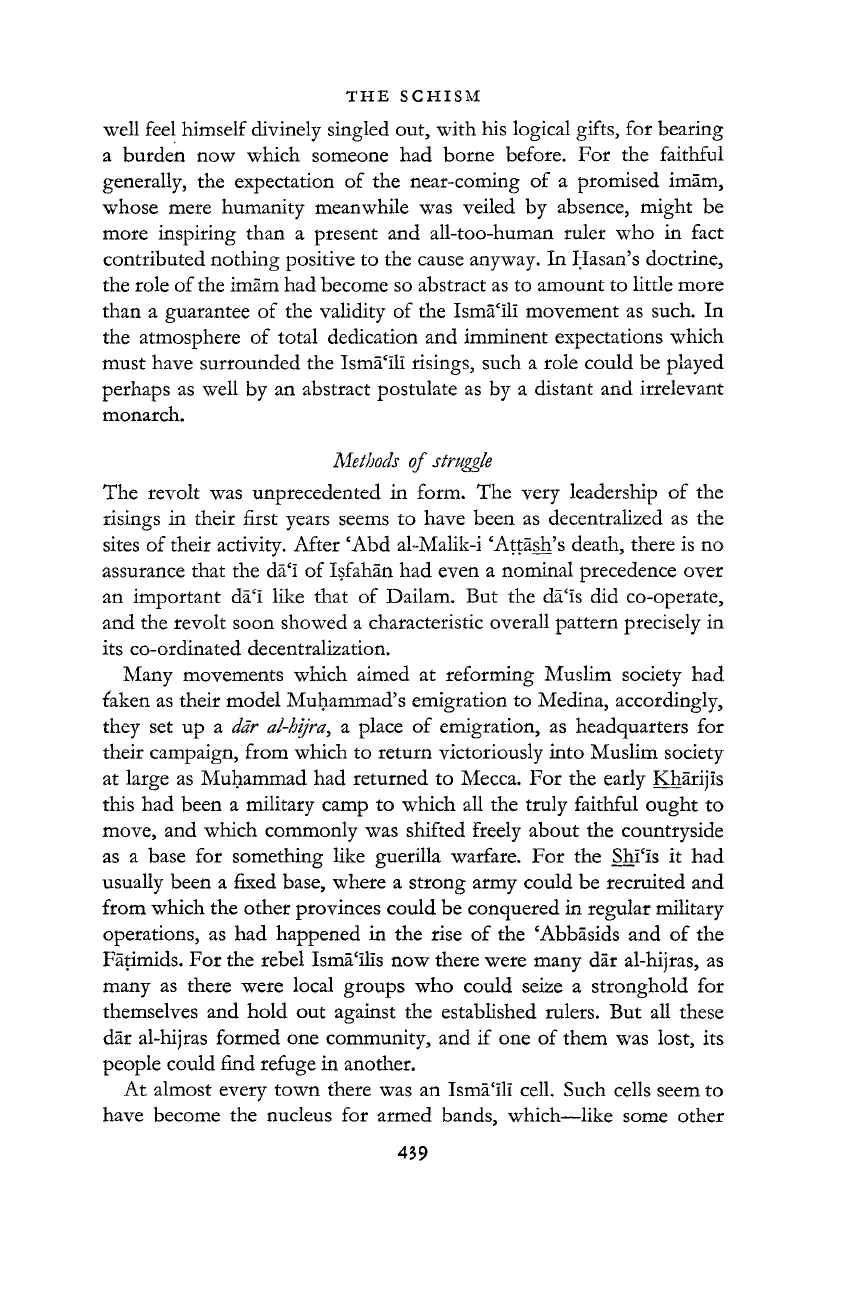
THE
SCHISM
well
feel
himself divinely singled out, with his logical
gifts,
for bearing
a burden now which someone had borne before. For the faithful
generally,
the expectation of the near-coming of a promised imam,
whose
mere humanity meanwhile was veiled by absence, might be
more inspiring
than
a present and all-too-human ruler who in fact
contributed nothing positive to the cause anyway. In Hasan's doctrine,
the role of the imam had become so abstract as to amount to little more
than
a guarantee of the validity of the Isma'Ili movement as such. In
the atmosphere of total dedication and imminent expectations which
must have surrounded the Isma'ili risings, such a role could be played
perhaps as
well
by an abstract postulate as by a
distant
and irrelevant
monarch.
Methods of
struggle
The
revolt was unprecedented in form. The very leadership of the
risings in their first years seems to have been as decentralized as the
sites of their activity. After 'Abd al-Malik-i 'Attash's death,
there
is no
assurance
that
the da'i of Isfahan had even a nominal precedence over
an important da
c
I like
that
of Dailam. But the da'Is did co-operate,
and the revolt soon showed a characteristic overall
pattern
precisely in
its co-ordinated decentralization.
Many
movements which aimed at reforming Muslim society had
taken as their model Muhammad's emigration to Medina, accordingly,
they set up a ddr al-hijra
y
a place of emigration, as headquarters for
their campaign, from which to
return
victoriously into Muslim society
at large as Muhammad had
returned
to Mecca. For the early Kharijis
this had been a military camp to which all the truly faithful ought to
move,
and which commonly was shifted freely about the countryside
as a base for something like guerilla warfare. For the Shi'is it had
usually
been a fixed base, where a strong army could be recruited and
from
which the other provinces could be conquered in regular military
operations, as had happened in the rise of the 'Abbasids and of the
Fatimids. For the rebel Isma'llls now
there
were many dar al-hijras, as
many as
there
were local groups who could seize a stronghold for
themselves
and hold out against the established rulers. But all these
dar al-hijras formed one community, and if one of them was lost, its
people
could find refuge in
another.
At
almost every town
there
was an Isma'ill
cell.
Such cells seem to
have
become the nucleus for armed bands, which—like some other
439
